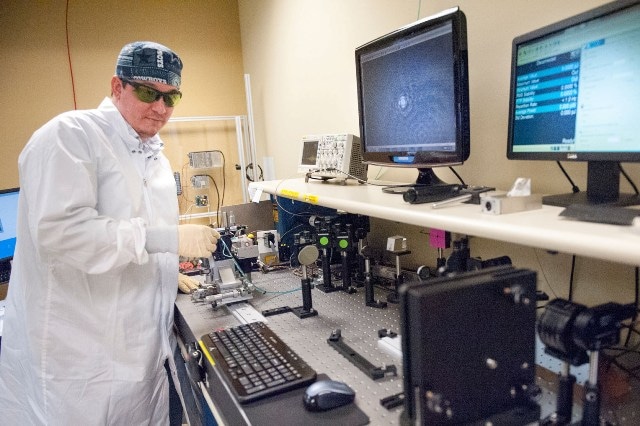May 27 2016
The Gallatin Valley is home to approximately 30 photonics and optics companies – the highest per capita concentration of such companies in the U.S. – but skilled photonics technicians are needed to grow the industry.
 Laser technician Lance Lusby works on a laser sub-assembly at the Quantum Composers facility in Bozeman. MSU photo by Kelly Gorham.
Laser technician Lance Lusby works on a laser sub-assembly at the Quantum Composers facility in Bozeman. MSU photo by Kelly Gorham.
Local training hasn’t been available to prepare individuals to fill these positions, but that will soon change, thanks to a new Gallatin College Montana State University program.
The two-year program will prepare graduates to work as technicians in laser optics and photonics companies. It will lead to an associate’s degree in photonics and laser technology.
To help support the program, Gallatin College MSU has received a $199,450 grant from the National Science Foundation. The grant provides important financial assistance, and it also serves as a sign of confidence in the program, according to Stephanie Gray, program development manager for Gallatin College MSU.
“This program provides people with training to help grow an industry that touches many different aspects of our lives,” Gray said. “The NSF’s investment in this program shows just how important the work is.”
Gallatin College MSU also recently hired a new director for the program, Trent Berg, who has 12 years of experience in the industry locally. Berg has worked for a variety of photonics and laser companies, most recently Blackmore Sensors and Analytics and Bridger Photonics. Berg has a bachelor’s degree in computer science and a master’s degree in electrical engineering with an optics/photonics emphasis, both from MSU. He also assisted Gallatin College MSU on the application for the recently awarded NSF grant and is an active member of the Montana Photonics Industry Alliance, which serves as a hub for Montana’s optics and photonics companies, entrepreneurs, laboratories, and universities.
“I am very excited for the opportunity to develop and lead this new photonics and laser technology program at Gallatin College,” Berg said. “There are over 30 optics, photonics or laser-based technology companies in the Gallatin Valley alone, so this program is a critical addition to the local and statewide infrastructure to support this large and rapidly growing industry. I can't wait to start working with the amazing staff at Gallatin College and our local industry to train the next generation of photonics employees."
Gray said that photonics and optics are essential components of virtually every technology field.
“Photonics technology has been described as the electricity of the 21st century,” said Gray, and added that the potential range of applications is vast. “Photonics technicians must be proficient in the scientific principles of optics, fiber-optics and lasers so that they can apply that knowledge to enable products that are used across a wide range of fields, including solar energy, medical instruments, telecommunication, information technology, biotechnology, bio-medicine, precision measurements, remote sensing, microtechnology and nanotechnology, environmental monitoring, entertainment, lighting and national defense and security.”
Brett Gunnink, dean of the MSU College of Engineering, said the college is committed to collaborating with Gallatin College MSU by sharing classroom and laboratory space and equipment.
“We are pleased to support this new, important program and to work alongside Gallatin College MSU to help address the workforce needs of this industry,” Gunnink said.
Joe Shaw, director of the Optical Technology Center and a professor in the MSU Department of Electrical and Computer Engineering, is co-principal investigator on the NSF grant.
"While the majority of new companies are formed by our Ph.D. and master's degree graduates, as those companies grow they require a broader range of employees,” Shaw said. “This new technician program will provide a valuable local source of graduates who can fill important roles for our growing optics and photonics industry in Montana."
Steve Birrell, president and CEO of Bozeman-based Quantum Composers, said the program will benefit companies in the valley. Founded in 1993, Quantum Composers is a private company that manufactures instrumentation and laser systems. The company currently employs 20 people, seven of whom are technicicans, Birrell said.
“To really continue the growth in this industry, we need both graduates from the university in physics and engineering, but also those who can provide technician support, which is what the Gallatin College program is providing,” Birrell said.
“It’s a good opportunity for kids who do not choose to get a four-year degree to find a good-paying job and stay in Bozeman,” he added.
Gray said the average annual salary for technicians in the photonics and laser optics field is $41,137 nationally; locally, the average annual starting salary ranges from $30,000-$38,000.
Gray noted that the new program has been approved by MSU and the Montana Board of Regents; approval from the Northwest Commission on Colleges and Universities is currently being sought.
Classes will begin in the fall for the first group of students to enroll in Gallatin College MSU’s associate’s program in photonics and laser technology. In addition to that program, Gallatin College MSU offers programs and certificates in areas such as aviation, CNC machining technology, bookkeeping, business management, design drafting technology, health information coding, interior design, medical assistant and welding technology. It also offers associate degrees, developmental coursework in math and writing, and dual enrollment courses at local high schools.